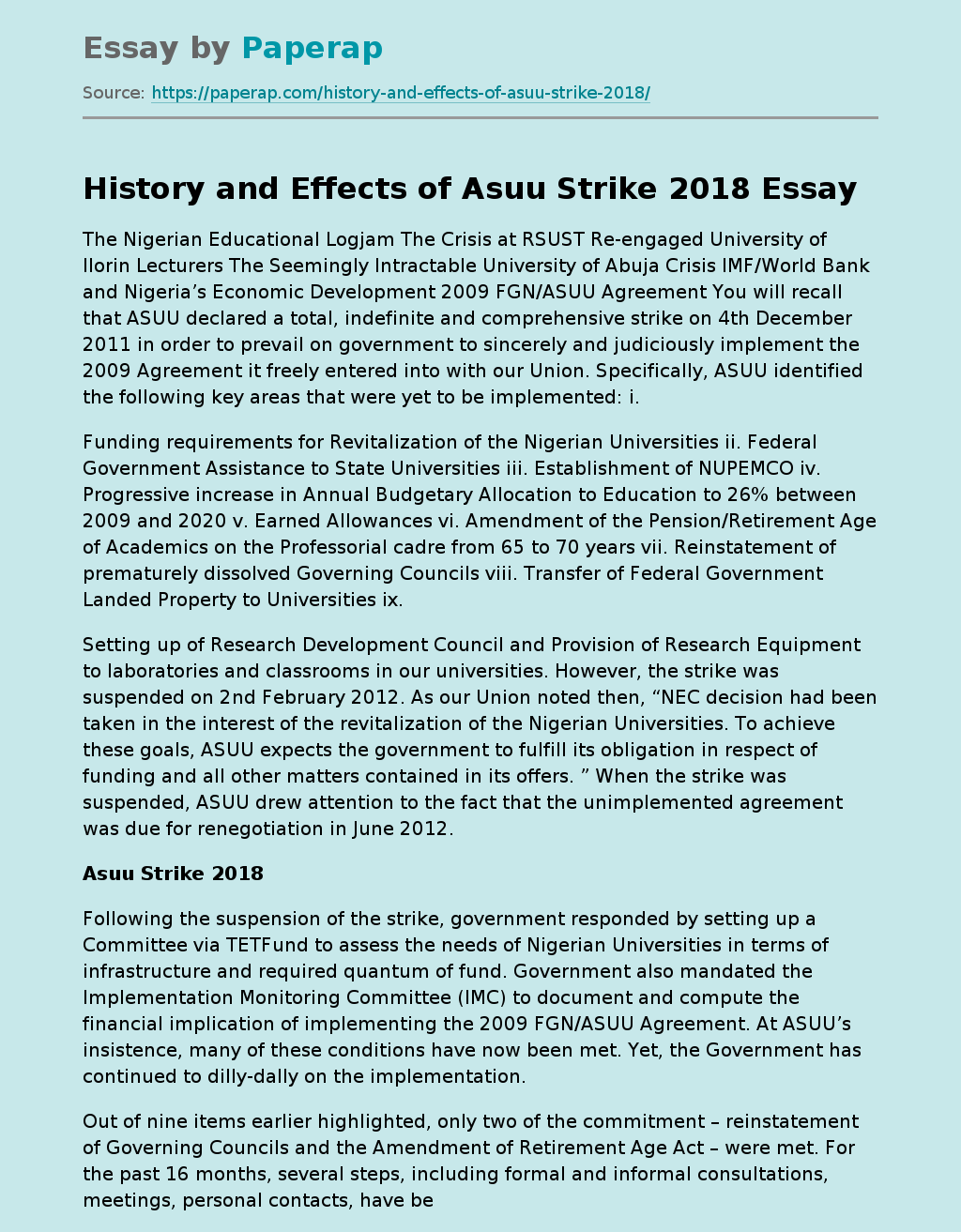History and Effects of Asuu Strike 2018
The following sample essay talks about the History and Effects of Asuu Strike 2018. Read the introduction, body and conclusion of the essay, scroll down.
The Nigerian Educational Logjam The Crisis at RSUST Re-engaged University of Ilorin Lecturers The Seemingly Intractable University of Abuja Crisis IMF/World Bank and Nigeria’s Economic Development 2009 FGN/ASUU Agreement You will recall that ASUU declared a total, indefinite and comprehensive strike on 4th December 2011 in order to prevail on government to sincerely and judiciously implement the 2009 Agreement it freely entered into with our Union.
Specifically, ASUU identified the following key areas that were yet to be implemented: i.
Funding requirements for Revitalization of the Nigerian Universities ii. Federal Government Assistance to State Universities iii. Establishment of NUPEMCO iv. Progressive increase in Annual Budgetary Allocation to Education to 26% between 2009 and 2020 v. Earned Allowances vi. Amendment of the Pension/Retirement Age of Academics on the Professorial cadre from 65 to 70 years vii. Reinstatement of prematurely dissolved Governing Councils viii.
Transfer of Federal Government Landed Property to Universities ix.
Setting up of Research Development Council and Provision of Research Equipment to laboratories and classrooms in our universities. However, the strike was suspended on 2nd February 2012. As our Union noted then, “NEC decision had been taken in the interest of the revitalization of the Nigerian Universities. To achieve these goals, ASUU expects the government to fulfill its obligation in respect of funding and all other matters contained in its offers. ” When the strike was suspended, ASUU drew attention to the fact that the unimplemented agreement was due for renegotiation in June 2012.
Asuu Strike 2018
Following the suspension of the strike, government responded by setting up a Committee via TETFund to assess the needs of Nigerian Universities in terms of infrastructure and required quantum of fund. Government also mandated the Implementation Monitoring Committee (IMC) to document and compute the financial implication of implementing the 2009 FGN/ASUU Agreement. At ASUU’s insistence, many of these conditions have now been met. Yet, the Government has continued to dilly-dally on the implementation.
Out of nine items earlier highlighted, only two of the commitment – reinstatement of Governing Councils and the Amendment of Retirement Age Act – were met. For the past 16 months, several steps, including formal and informal consultations, meetings, personal contacts, have been employed to avert resumption of the suspended action. We seem to have now exhausted all available options. Our members cannot understand why a Government finds it difficult to fulfill an Agreement voluntarily entered into with the Union in 2009 as well as the MoU that was introduced following ASUU’s protest against government’s demonstration of bad faith in 2012.
EFFECT OF ASUU STRIKE
Despite the poor research and innovation capability of our present set of universities, incessant strike will continue to jeopardize the little research they are undertaking. The kind of research and development activities that can put Nigeria in the league of developed nation cannot take place in a disruptive environment like the one we are currently witnessing in our universities.
It is, therefore, clear that the current ASUU strike will have negative effect on our industries and from there our Gross Domestic Products (GDP). As Daily Trust argued in her editorial of Tuesday December 13, 2011, ‘the physical structure of many universities are substandard, books are either out of date or not available, the conduct of examinations does not meet minimum requirement, and the standard of learning, especially of English, is atrocious. No concrete learning and research can take place in atmosphere such as this, hence, the sympathy that ASUU continue to generate from the Nigerian public, and people condemnation of federal government I don’t care attitude towards the education sector, but at the same time we have to acknowledge the fact that ASUU continue resort to strike is jeopardizing the very sympathy they have garnered so far from the public. What is the way out?
First and far most federal government must realize that it vision of taking Nigeria into the league of 20 largest economies in the world can not be realistic without the simultaneous empowering of our education sector and the power supply, two key raw materials for boosting economic growth in Nigeria. Like the federal government is giving it self a target of putting Nigeria in the league of 20 largest economies, it should also give itself the target of putting the best of Nigerian universities into the league of top 100 universities in the world.
History and Effects of Asuu Strike 2018. (2019, Dec 05). Retrieved from https://paperap.com/history-and-effects-of-asuu-strike-2018/

